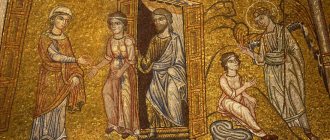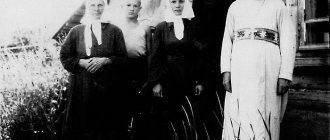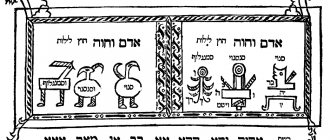The Bible tells readers many interesting and touching stories. We meet interesting characters who perform great feats, sometimes finding themselves in fantastic or difficult circumstances, but with the help of God they remain unharmed.
The story of Abraham, the progenitor of the Jewish family, and his wife is a story of deep trust in the Almighty. The life of these ancient people was full of trials, difficulties, passions, mistakes, but they always followed God, even when it was hard and they could not believe that the Lord would fulfill his promises.
One of the most striking female characters in the Old Testament was the wife of the forefather of the Jewish people. What was the name of Abraham's wife, her life story, behavior, character, purpose and fate will be shown in this article.
Where it all started
The Bible tells us that Abram lived with his father and brothers in the Sumerian city of Ur, located on the banks of the Euphrates River. Ur was famous for its ports, where many ships were moored. This large city quickly grew rich in trade with other lands, including Canaan. Abram's father, Terah, decided to leave Ur and go the hard way to Canaan. When they reached a place called Harran, the father died and Abram became the head of the family.
At this time, God appeared to Abram and said that he must leave his home in Haran and follow to the lands that the Lord would show him. This choice was difficult for Abraham. He loved life in the city, but did not want to run away from God, he listened to the voice of the Creator and trusted Him. The Lord said that Abram would become the forefathers of an entire nation if he obeyed Him. God changed his name to Abraham, which means “parent of many.” In the 12th chapter of the book of Genesis we read the following lines:
And the Lord said to Abram, Get thee out of thy country, from thy kindred, and from thy father's house, unto the land that I will show thee; and I will make you into a great nation, and I will bless you, and I will make your name great, and you will be a blessing.
In Harran, Abraham left the farm to his brother, Nahor, and he himself chose the path of a Bedouin cattle breeder. His nephew Lot and his faithful wife left the rich lands with Abraham. Abraham's wife's name is Sarah.
Who is Abraham in the Bible
Abraham is considered the greatest prophet. Even Jesus in the New Testament is called the Son of Abraham. From him came the great nation of Israel.
The forefather was born after the flood. He is a member of the tribe of Noah, the son of Terah. Abram, which was his name from birth, had two brothers: Nahor and Haran. Haran died early and left his son Lot orphan. As a result, Abram took his nephew into his care. He also married Sarah, who turned out to be barren. One day, the head of the clan of Terah took his family and went to the land of Canaan.
The meaning of the name and appearance of Sarah
Let us dwell on the image of Abraham's wife. Abraham's wife in the biblical tradition was named Sarah. Translated from Hebrew, the name Sarah means “princess”, “mistress of many”. At birth, Sarah had a different name - Sarah or Sarai, which meant “noble.” But God, when he added the second letter a to Abram, did the same with Sarah, only added a second r to the name. This began to mean that Sarah would be the mother of a large people.
Sarah became Abraham's wife in Ur of the Chaldeans, where they grew up and lived until they decided to go to the land of Canaan. She was her husband's half-sister. Abraham's wife Sarah accompanied her husband on all his travels and was about 10 years younger than him. Sarah is considered the ancestor of the Jewish people. But at the time she left Ur, the nationality of Abraham's wife was not yet Jewish. Their descendants began to be called Jews. With a greater degree of probability, we can conclude that Sarah was a Chaldean, since she grew up in Mesopotamia, on the right bank of the Euphrates River, where the Chaldeans lived in those days.
It is clear from Scripture that Sarah was a very beautiful woman. There are no verses in the Bible that praise Sarah's beauty, however, if we take the narrative context, we can conclude that Abraham's wife was beautiful.
Looking ahead, let's say that his girlfriend was so beautiful that Abraham, fearing for his life, tried to pass Sarah off as his own sister when they lived at the court of the Egyptian pharaoh and the king of Gerara, Abimelech. Abraham had much to fear. Then there were many cases when rulers, without hesitation, could kill a person and take his beautiful wife to themselves. Abraham's wife obediently followed her husband's commands and obeyed him in everything.
Character of Sarah
Abraham's wife Sarah was not an obedient puppet in the hands of her husband.
Yes, she obeyed Abraham, but she had a harmful and at times stubborn character, thanks to which she could insist on her decision. In Genesis chapter 21, verse 12, God personally tells Abraham to obey the voice of his wife:
in everything that Sarah tells you, obey her voice.
Abraham regularly turned to his wife for requests or advice, and also considered it important for himself to get Sarah's approval in order to make this or that decision.
As described in the Bible, Sarah, Abraham's wife, told her husband what to do, and he carried out her requests. An example is the relationship between Sarah and Hagar. Sarah asked Abraham to throw out the maid who had given birth to his son. Abraham did not want to throw Hagar out, but Sarah showed toughness in her character, and he was forced to listen to his wife. Abraham sent the maid and her son into exile, although he did it against his will.
Sarah's Prophecy [↑]
Sarah was, as we remember, the first of the seven Jewish prophetesses. Other foremothers were also prophetesses [3], but of them only Sarah received a prophecy that was significant for future generations: “The son of this slave woman will not inherit along with my son Isaac” (Genesis 21:10).
Sarah was a prophetess from birth, so at birth she was given the name Iska, which is interpreted as “contemplation”, “vision”, meaning her prophetic gift, the ability to “see”, “provide”.
The level of Sarah's prophecy was higher than the level of Abraham's prophecy. This follows from the fact that the Almighty “affirmed” her decision to expel Hagar and Ishmael, and said to Abraham: “Whatever Sarah tells you, obey her voice...” (Bereishit 21, 12).
Sarah in Egypt
When Abraham left his home in Harran and wandered through the land of Canaan, there was a severe famine in these parts; there was no food. So he went to Egypt to support his family and servants.
When Abraham found himself in Egypt, he gave Sarah to the palace of Pharaoh. A logical question arises. Why did Abraham give his wife to Pharaoh? The answer lies in the character of Abraham. He was afraid that he would be killed. Even in Canaan, he heard from travelers who met on his way that the Egyptian pharaohs, if they see a beautiful wife from their husband, will do everything so that the woman becomes an adornment of their court. Many men suffered from the rulers' desire to possess their wives and were killed. For this reason, Abraham gave his wife to Pharaoh - in order to stay alive.
In the 12th chapter of the book of Genesis we read that on the way to Egypt, Abraham asked Sarah not to tell anyone that they were spouses. He persuaded him to say that she was his sister, then he would be left alive and the pharaoh might well give him gifts:
and when the Egyptians see you, they will say, “This is his wife.” and they will kill me, but leave you alive; tell me that you are my sister, so that it may be good for me for your sake, and so that my soul may live through you.
Sarah obeyed her husband, as she had done before. She realized that such a move could lead to family enrichment and prosperity. Abraham was a savvy man; before, his cunning brought them only benefit.
And so it happened. In Egypt, the beauty of Sarah attracted the attention of the nobles of Pharaoh, she was taken to serve in the palace, and “brother” Abraham was given small and large livestock, male and female slaves.
But God did not want Abraham to live in deception and not fulfill his destiny. The Lord struck Pharaoh and his family with a terrible disease, and then the deception on Abraham’s part was revealed.
One day, Pharaoh called Sarah and Abraham to him. He asked why they deceived him, because soon Pharaoh was planning to marry Sarah and take her as his wife. The ruler of Egypt was very upset, but was merciful and drove the deceivers out of the palace, and his servants escorted them to the border with Canaan.
Sarah's beauty [↑]
Sarah had extraordinary beauty. The Talmud calls her one of the four most beautiful women of all time. The rest are Abigail, Rahab, Esther, and according to some opinions, Vashti (instead of Esther).
Because of her beauty, Abraham's life was in danger more than once. Abraham knew that, having heard about the appearance of such a beautiful woman, any local ruler would want to marry her and kill her husband. Therefore, wherever Abraham and Sarah went, Abraham introduced her as his sister. He was confident in Sarah's absolute righteousness and knew that G-d would not allow her to be desecrated.
Scripture records two occasions when Sarah was taken to a local ruler: the first time to Pharaoh, when Abraham was forced to go down to Egypt due to famine; the second - to Abimelech, king of Grar. In both the first and second cases, G-d miraculously protects and saves Sarah, after which she and Abraham are given gifts and seen off with great honors as prophets of G-d.
Sarah and Hagar
After Egypt, Abraham returned to Canaan with his family, livestock, and slaves. Between Bethel and Ai, at the sacrificial stone that he had made long ago, Abraham thanked God for keeping him on the road and keeping him from the wrath of Pharaoh. At this point, Abraham parted with his nephew Lot, who decided to separate from his uncle and live independently.
Abraham settled in Hebron, near the oak grove of Mamre. God's promise that Sarah would give birth to a child from whom Abraham's descendants would come was still not fulfilled. The Lord repeatedly confirmed his covenant with Abraham that he would give them a child. Time passed, Sarah grew old, and no heir was born. Then Sarah decided to take this problem into her own hands and thought that if she was not destined to give birth to a child, let the servant give birth to her and Abraham.
Sarah brought to her husband the maid she had brought with her from Egypt. The maid's name was Hagar. She told Abraham to spend the night with her so that Hagar could conceive a child. It is interesting that Abraham listened to Sarah. In Genesis 16:2 we read:
Behold, the Lord has shut up my womb, that I should not give birth; Go in to my maid; perhaps I will have children by her. Abram listened to Sarai's words.
Sarah assumed that when Hagar gave birth to a child, she would be able to take the child to her so that her husband would have a long-awaited heir to whom he could leave all his property.
Abraham, without asking any questions, followed his wife’s advice and came to the maid’s tent to conceive a child. They spent a pleasant night, after which Hagar realized that she was carrying a child within her.
When Hagar found out she was pregnant, she hated her mistress, Sarah. From the biblical context it follows that Sarah ran to her husband and began to scold him, express her complaints to him, and declare Abraham guilty of her situation: what is this, I let you spend the night with my maid, and she despises me. Of course, a very strange act by a woman: she became an organizer herself, allowed her husband to cheat with a maid, and then looks for those to blame on the side. In verse 6 of chapter 16 we read Abraham's response:
Behold, your handmaid is in your hands; do with her what you please.
Abraham washed his hands of the matter and left the fate of Hagar to his wife, because she is her servant, let Sarah deal with her herself. And Sarah began to oppress, insult and humiliate Hagar. Most likely, the maid was brought to such a state that she could no longer tolerate her mistress’s insults, and left the Mamre oak grove and ran away.
When Hagar found herself in the desert, an angel of God appeared to her. He told her to return to Abraham and Sarah and become obedient to her mistress. An angel conveyed God's message to Hagar that she would become a great nation (Genesis 16:10):
By multiplying I will multiply your descendants, so that they cannot even be counted from the multitude.
Hagar returned to Sarah and gave birth to a son, whom she named Ishmael. He is considered the ancestor of the Arab tribes.
Sarah in this episode represents a shrewish, vindictive woman with a sinful human nature. Sarah is an ordinary person. She does not see her mistakes, but tries to blame others for the misfortunes that happen in her life.
> All books >
«
WOMEN OF THE BIBLE
«
2 Sarah
Sarah was very beautiful, but she was already sixty-five years old and had no children. For a woman whose life had spanned more than a hundred years, sixty-five was probably no more than midlife. Sarah had been married for many years, and in a world where the success of a marriage was determined by the number of sons, her childless existence was deeply regretted, but no change was foreseen. A few years earlier, Terah's family—son Abram, daughter-in-law Sarai, and grandson Lot—had migrated from the comfortable and perverse life of the Chaldean city of Ur and settled in Horan. When Terah died, Abram, in obedience to God's command, left Haran and went “not knowing where.” Sarah and Lot went with him, accompanied by servants, mostly shepherds; after all, Abram was rich and had many sheep and various livestock. They came to the country of Canaan, slowly moving south from the north. And the Lord, appearing to Abram, said: “To your descendants I will give this land.” But some time later, a severe famine occurred in the country of Canaan. The most accessible refuge was the fertile land of Egypt, and Abram and his entourage headed there. As they approached the Egyptian border, Abram began to fear for himself. Sarah was beautiful, but the Egyptians were a dissolute people and their monarch was all-powerful. It seemed likely to him that he would be killed because of his wife, and he told her to tell him that she was not his wife, but his sister. It seems strange that a man whose faith in God's promise had never wavered could fear for his life, as if the broken promises had ever taken place. (Although in fact this was partly true, since Sarah was his half-sister). Knowing the morals and customs of the Canaanites, he treated all foreigners with distrust. There was reason for his fears, since the Egyptians, seeing Sarah's beauty, told Pharaoh about her, who took her into his harem and rewarded Abram with servants and cattle. We don’t know how Sarah felt, but remembering the agreement, she claimed that she was Abram’s sister and remained in the harem until God intervened. Before Pharaoh could accept her as his wife, disaster befell him and his household, thus thwarting his intentions. Most likely, Sarah was asked and she herself revealed the truth. In any case, having learned the truth, Pharaoh returned Sarah to her husband and released them. And now, having become richer than before, Abram and Sarai and Lot returned to Canaan. Among the newly acquired slaves was a young Egyptian woman, Hagar, who became Sarah's personal servant.
Son of Hagar
We're skipping a few years. Sarah, no doubt, spent this time spinning, weaving and overseeing her very extensive farm. There were still no children, and each passing year seemed to make the promise less and less feasible. God assured Abram that he would be the father of countless offspring, but he did not say that Sarai would be their mother, and Sarai became restless and impatient. So she gave her maid Hagar as a concubine to Abram, saying, “Perhaps I will have children by her.” This was in accordance with the customs of that time. In such cases, the wife had the right to consider her maid's children as her own. But Hagar, feeling pregnant, became impudent and made it clear that she despised her mistress for her childlessness. This was offensive to Sarah and she complained to Abram. And although it was her own idea, she severely blamed him for Hagar's insolence. Perhaps she wanted to reproach him for not punishing Hagar. Abram left Sarah to do as she pleased with Hagar. In such cases, the servant could not be sold, but she could be treated roughly and deprived of her privileges as the future mother of her mistress's children. Hagar endured this for some time, but then she ran away. Whether she was treated less harshly when she returned we do not know. No doubt, if Hagar had behaved humbly, as the angel instructed her, she would have had little reason to complain about her treatment. (Genesis 16:16; 17:1) Thirteen years had passed after the birth of Ishmael, the son of Hagar, when God appeared before Abram, repeating his promise and commanded him to be circumcised, as well as to change his name to Abraham (“Father of Multitudes”). . At the same time, Sarah was named differently. God changed her name to Sarah (“Princess”) and said, “I will bless her and give you a son by her; I will bless her, and nations will come from her, and kings of nations will come from her.” Then Abraham fell face down and smiled. Was it a smile of disbelief, or a smile of amazement and joy? But we are told that he “failed not of the promise of God through unbelief” (Rom. 4:20), probably after all it was the smile of joy to which the great descendant refers when he said: “Abraham... was glad to see my day.” (John 8:56). But Abraham made sure that Ishmael was also included in the inheritance after a new heir appeared. And God assured him that Ishmael would also be blessed, but “I will establish my covenant with Isaac, whom Sarah will bear to you.”
“Is there anything difficult for the Lord?”
Soon after this, three strangers came to the camp of Mamre. Abraham, with oriental hospitality, hastened to prepare food for them, while Sarah made unleavened bread. They sat in the shade of the oak trees and ate, and Abraham stood next to them under a tree, ready to serve them. Sarah remained under the tent at this time. Hearing the guests mention her name, she listened carefully, and was surprised when they said: “And Sarah your wife will have a son.” A ninety-year-old woman, long past menopause, will give birth to a son! Absurd! Sarah laughed to herself, thinking: “Should I, when I am old, have this consolation? And my lord is old." Probably mistaking the travelers for ordinary men, she thought that these words were simple politeness. Courtesy did not allow her to laugh loudly, so she was alarmed when one stranger said: “Why did Sarah laugh?.. Is there anything difficult for the Lord?” She quickly withdrew her smile, but he said: “No, you laughed.” And then it dawned on her that these were not simple strangers, and faith, having triumphed over unbelief, gave her “strength to receive the seed... for she knew that He who promised was faithful” (Heb. 11:11). It is interesting to note that this is the only time Sarah called Abraham lord while mentally speaking to herself. The Apostle Peter, urging wives to be submissive to their husbands, after the examples of “holy women who believed in God,” adds: “So Sarah obeyed Abraham, calling him lord; you are her children if you do good” (1 Pet 3:6). Submissive, of course, but not a slave! After this, Abraham moved south, either in search of fresh pastures for his flocks, or perhaps he felt uneasy staying where everything reminded him of the terrible fate of Sodom and Gomorrah; he came to Gerar. Again they declared themselves brother and sister, and as a result Abimelech (that was the name of the Philistine king) took her into his household. Now hardly anyone can imagine that an old woman can be so attractive as to expect danger, but Sarah after the visit of the angels looked younger, and looked the same as Pharaoh took her twenty-five years ago. And again God intervened. He not only turned Abimelech away from his intention to dishonor Sarah (apparently by sending him some kind of illness), but also, appearing to him in a dream, warned him that Sarah was a married woman, and that he would be killed if he did not return her to her husband. Abraham was mistaken in thinking that “there is no fear of God here” - Abimelech turned out to be a man of honor. Early in the morning he sent for Abraham and, reproaching him for his deceit, gave him gifts of sheep, cattle and slaves, the acceptance of which meant that Sarah's chastity was recognized and that the offense was forgiven. And to Sarah he said with a polite smile: “Behold, I have given your brother a thousand shekels of silver; Behold, this is a covering for your eyes before all who are with you” (Gen. 20:16). After this, Abraham prayed to God and God healed Abimelech and his harem.
The Promised Son
In due course, Sarah gave birth to a son, who was named Isaac (“Smiles”), as God taught Abraham. “God made a smile for me; everyone who sees will smile at me” (RSV) – said Sarah and her smile expressed sincere admiration. At the age of two or three Isaac was weaned, and a great celebration was held to mark the occasion. But among the general fun, there were two who were not happy - Hagar and Ishmael, who was already 16 or 17 years old. Hagar could no longer boast that she was the mother of Abraham's only son, and Ishmael could no longer consider himself the only heir. And vigilant Sarah saw that Ishmael was mocking her son (Genesis 21:9). This seems harmless enough, but remember Paul, who mentioned that Ishmael persecuted Isaac (Gal 4:29). His behavior must have seemed provocative to say the least. “Drive away this slave woman and her son,” she said to Abraham, “the son of this slave woman will not share the inheritance with my son Isaac.” Abraham was upset - after all, Ishmael was also his son, but God told him to do as Sarah ordered. So Hagar and Ishmael were driven out. We will read nothing more in the book of Genesis about Sarah. We are not told whether Abraham informed her of God's command to him when he took Isaac and three servants and set out for the land of Moriah. We can only guess. Abraham probably saved her feelings; in any case, he believed: “...God is powerful and is able to raise him (Isaac) even from the dead” (Hebrews 11:19), and he firmly hoped that Isaac would return home with him again, as he told his servants: “I and son let us go there and worship, and return to you.” So Sarah lived, seeing Isaac reach the age of 37, and died at the ripe old age of 127. And although Isaac was the only descendant of hers whom she saw, later her descendants were as numerous as the stars in the sky or the sand on the seashore.
Slave and free
Everything the Apostle Paul talks about is an allegory. Inspired by God, he takes the story of Abraham, Sarah, Hagar, Ishmael and Isaac from the Old Testament and gives them new meaning (Gal 4:22 - 31). He contrasts Hagar and Sarah, likening them to Jews and Christians. Hagar was a slave, and her children were also supposed to become slaves. She represents Sinai, where the Law of Moses was given, a law that could not give life. Jerusalem in Paul's day lived by this law. “We are Abraham’s seed,” they said proudly, “and we have never been slaves to anyone” (John 8:33), forgetting that descendants from Abraham do not guarantee God’s approval. Ishmael was also a descendant of Abraham, like many others. He was a slave under the law, a slave of sin, and like many, he persecuted the true heir. The fate of such people is to be expelled. Sarah is a free woman and a princess, and her children are free, with the glory of freedom as “the children of God” (Rom. 8:21). These are the children of the promise, born not according to the will of man, not according to the will of the flesh, but of God (See John 1:13). So Isaiah says: “Rejoice, you who have not given birth, you who have not given birth, ... for she who is forsaken has many more children than she who has a husband” (54:1). Both women have many descendants, but Sarah's descendants include all those who became children of Abraham through baptism. Isaiah continues: (verse 5) “…for your Maker is your husband, the Lord is his name.” We see Sarah not only as an example of a perfect wife, but also as an example of the church, to whom it is said: “You have captivated my heart, my sister, my bride...” and “How sweet are your caresses, my sister, my bride” (Song of Solomon 4:9 ,10). Our last glimpse of Sarah is in Revelation, where John sees the new Jerusalem coming down from God out of heaven, prepared and adorned as a bride for the groom (Rev 21:2). She is amazingly beautiful. Her memory is immortal. She is the mother of us all.
| 1. Eve | 10. Jochebed |
| 2. Sarah | 11. Mariam |
| 3. Hagar | 12. Rahab |
| 4. Lot's Wife | 13. Deborah |
| 5. Rebekah | 14. Samson's mother |
| 6. Leah | 15. Delilah |
| 7. Rachel | 16. Ruth and Naomi |
| 8. Tamar | 17. Anna |
| 9. Potiphar's Wife | 18. Abigail |
| 19 Bathsheba | 31 The Woman Touching Jesus' Clothes |
| 20 Queen of Sheba | 32 Xaneyanka |
| 21 Jezebel | 33 Martha and Mary |
| 22 The Widow of Zarephath | 34 Mary Magdalene |
| 23 Little Captive Maid | 35 Tabitha |
| 24 Athaliah | 36 Lydia |
| 25 Ezekiel's Wife | 37 Priscilla |
| 26 Esther | 38 Thebe |
| 27 Elizabeth | 39 Lois and Eunice |
| 28 Mary - mother of Jesus | 40 Virtuous woman |
| 29 Anna | |
| 30 Woman at the Well |
Abraham's Guests
As Abraham sat at the entrance to the tent, like a true Bedouin, he noticed that three people were approaching him. Abraham ran up to these people and bowed, he somehow learned that one of the guests was the Lord. He was glad that God had come to visit him. The owner of the house began to fuss to feed the guests. Women were responsible for the household. Abraham ran to Sarah and asked her to bake unleavened cakes for the dear guests, and asked the servant to take the best calf and cook it.
The guests told Abraham that God would give him offspring and fulfill His covenant; what He promised would be fulfilled. Sarah overheard what her husband was talking about with the guests and laughed. It was funny to her that she could still give birth to a child. Sarah understood that she was old, and usually all the reproductive functions of the body at this age are no longer active.
The Lord did not understand Sarah’s laughter. The answer is described in the Bible: Abraham's wife, Sarah, shared her doubt that it was impossible to give birth to a child in old age. To which the Lord told Abraham that the child would be born next year.
When Sarah, Abraham's wife, heard what one of the guests said, she lied and said she didn't laugh. But nothing can be hidden from the Lord; He knows the heart of every person. Sarah was afraid that she doubted God's words, and so she told a lie.
Abraham, Sarah and Abimelech
Abraham wandered through the land of Canaan and on his way stopped in the city of Gerar, whose king was Abimelech.
In Gerar, the same scenario happened to Abraham as in Egypt. Abraham does not learn from mistakes, or vice versa, he realized that by passing off his wife as his sister, he could get benefits.
When in Gerar they saw that Abraham’s wife was a very beautiful woman, they told the king about this, and he in turn ordered her to be brought to the palace along with her man. Abraham, appearing before Abimelech, deceived the king, declaring that this was not his wife, but his sister. Sarah was silent and obeyed her husband in everything.
At night, the Lord came to Abimelech in a dream. He warned Abimelech not to touch Sarah and to return her to her husband in the morning. God warned the king that if he did otherwise, He would kill him and Abimelech’s entire family.
At dawn the king called Abraham and his wife to him. Abimelech was indignant at why Abraham did this to him; he asked him what prompted him to do such an act. Abraham stood before the king and honestly confessed everything. He said that he was afraid that he might be killed for the beautiful Sarah. Abraham explained to Abimelech that he and his wife agreed that no matter what land they came to, Sarah should say that Abraham was her brother. The forefather of the Jewish people partially lied. Sarah was his wife, but on their father's side they were brother and sister, but their mothers were different.
Abimelech returned his wife to Abraham, gave him money (silver shekels), livestock and slaves. The king of Gerara told Sarah that she was now justified before people and clean.
Origin [↑]
Sarah was born into a pagan family. Sarah's father, Haran, was Abraham's (her future husband) [1] paternal half-brother. The Midrash tells about the tragic death of Aran during the interrogation of Abraham by Nimrod, the formidable king of Mesopotamia. Abraham, who “promoted” faith in one G-d, an ardent opponent of paganism, posed a threat to the absolute power of Nimrod, who attributed divine power to himself. Nimrod ordered Abraham to be thrown into the fire, but the Almighty saved him miraculously.
When Nimrod interrogated Abraham, Aran decided: if Abraham comes out of the fiery furnace alive, then he, Aran, will follow Abraham and go into the fire for his faith in one G-d, and if not, he will take Nimrod’s side. After the miraculous salvation of Abraham, Haran declared his faith in one G-d and was thrown into the oven, where he died. After the death of Aran, Abraham marries his brother's daughter, Sarah, who then still bore the name Sarai, and raises Aran's son, Lot.
Fulfillment of the covenant
As God promised, the next year Sarah gave birth to a child, and they named him Isaac. The birth was not easy, Sarah was old.
After giving birth, Sarah looked at the child and grumbled that people would laugh when they found out that the old woman not only gave birth to a child, but was also able to breastfeed. In the 21st chapter of the book of Genesis we read:
And Sarah said, God made me laugh; whoever hears about me will laugh. And she said, Who would have said to Abraham, Sarah will suckle the children? for in his old age I gave birth to a son. The child has grown up and is weaned; and Abraham made a great feast on the day that Isaac was weaned.
Abraham rejoiced that the heir promised by God had been born, a child from whom would come a large nation. On this occasion, when Sarah stopped breastfeeding, he threw a rich feast.
Sarah's Righteousness [↑]
Sarah was a great righteous woman and, like Abraham, was distinguished by boundless hospitality. All the days of Sarah's life, the doors of their tents were open to travelers, no matter who they were. She prepared delicious meals for all the guests, as seen in the story of the three angels at the beginning of the chapter of Vaer.
It also emphasizes Sarah’s extraordinary modesty: she spent most of her time in the tent, trying not to show herself to strangers unnecessarily.
The Midrash lists three miracles in the house of Abraham that were sent as a reward for Sarah's merits: the Divine cloud always stood over her tent, the Sabbath candle burned from one Sabbath to the next, and the dough was always blessed. After Sarah's death, these miracles stopped, but resumed when Isaac married Rivka[2].
Goodbye Hagar
Sarah began to notice that Ishmael, the son of Hagar from Abraham, loved to mock the young Isaac - to tease and laugh at him. Sarah did not like this behavior of Ishmael. She came to Abraham and threateningly declared that her husband should drive out the slave and her son.
Sarah was cunning. She took advantage of the moment to get rid of the hated servant, Abraham's firstborn son Ishmael, so that her son would receive all the property that would come to him from his father.
Abraham submitted to his wife. He remembered the Lord's words that he should listen to Sarah's voice.
Early in the morning, Abraham collected bread and water, gave it all to the maid and sent her and Ishmael away from his tent. Abraham had a hard time parting with his firstborn, whom he loved, but he did not want to go against the will of his wife and God.
Hagar and her son wandered through the desert and got lost. When the water and food ran out, Ishmael was close to dying. Desperate Hagar laid her son under a tree, and she herself walked away so as not to see the death of her beloved youth. Hagar sat down on a stone and began to cry. But God did not abandon the Egyptian woman. An angel came and pointed her to a source of water. Happy Hagar and Ishmael ran and drank from the well. They settled next to a source of water. When Ishmael grew up, Hagar found him an Egyptian wife, with whom he had 12 sons.










